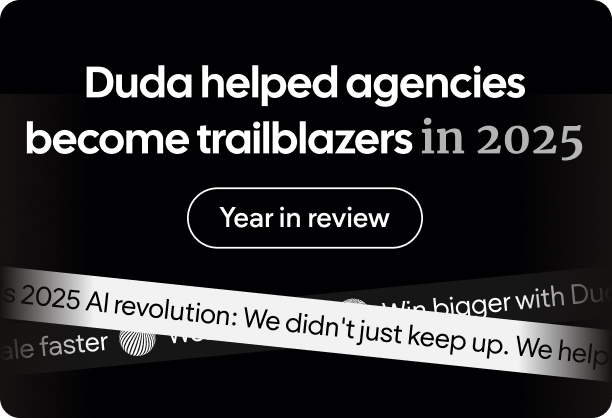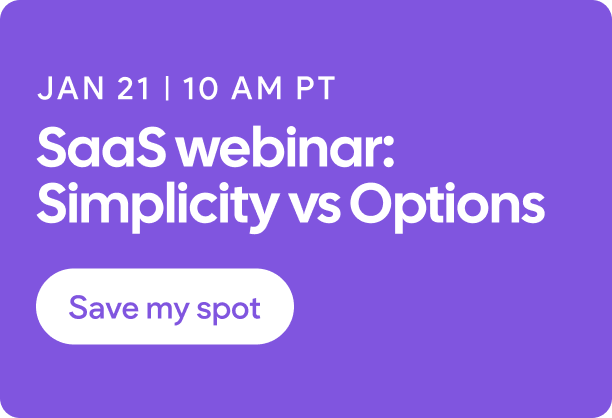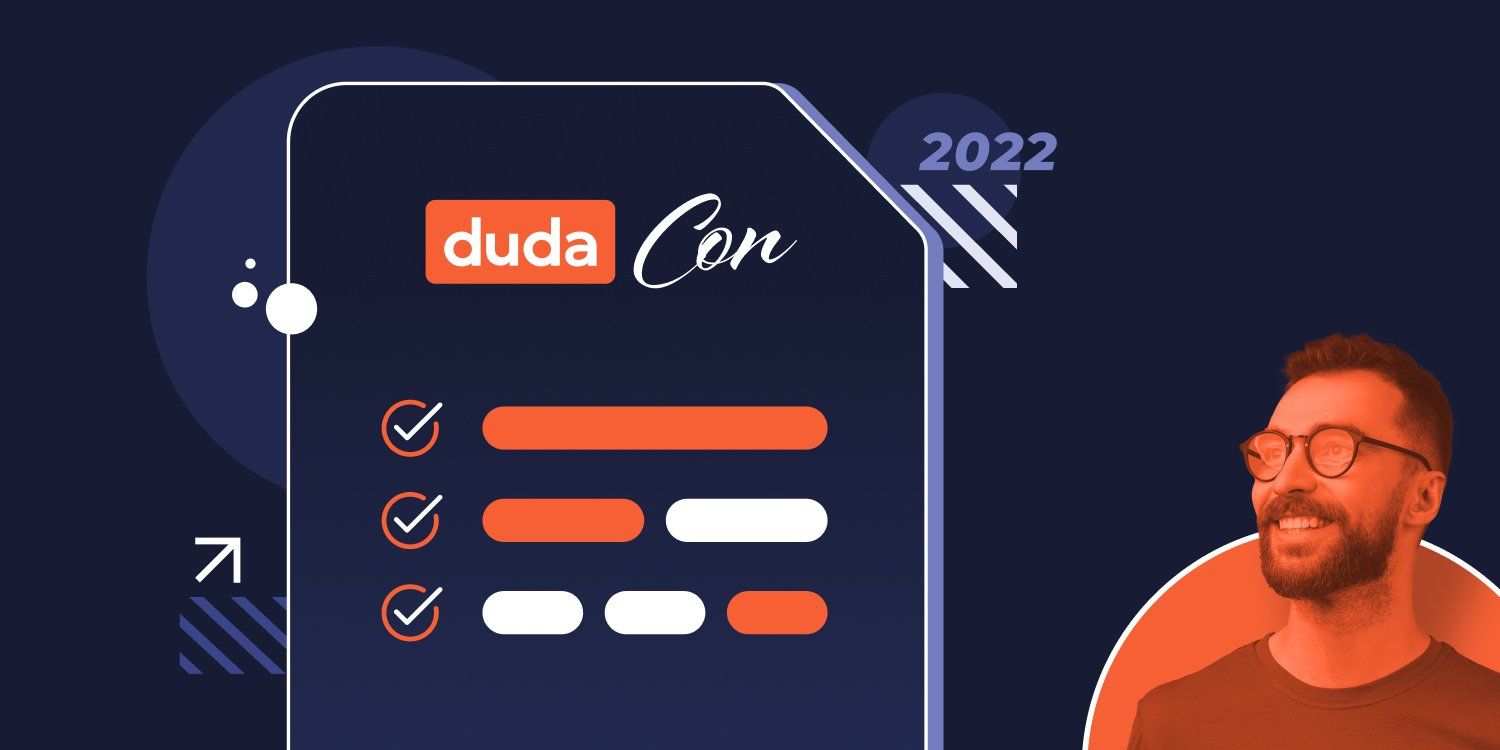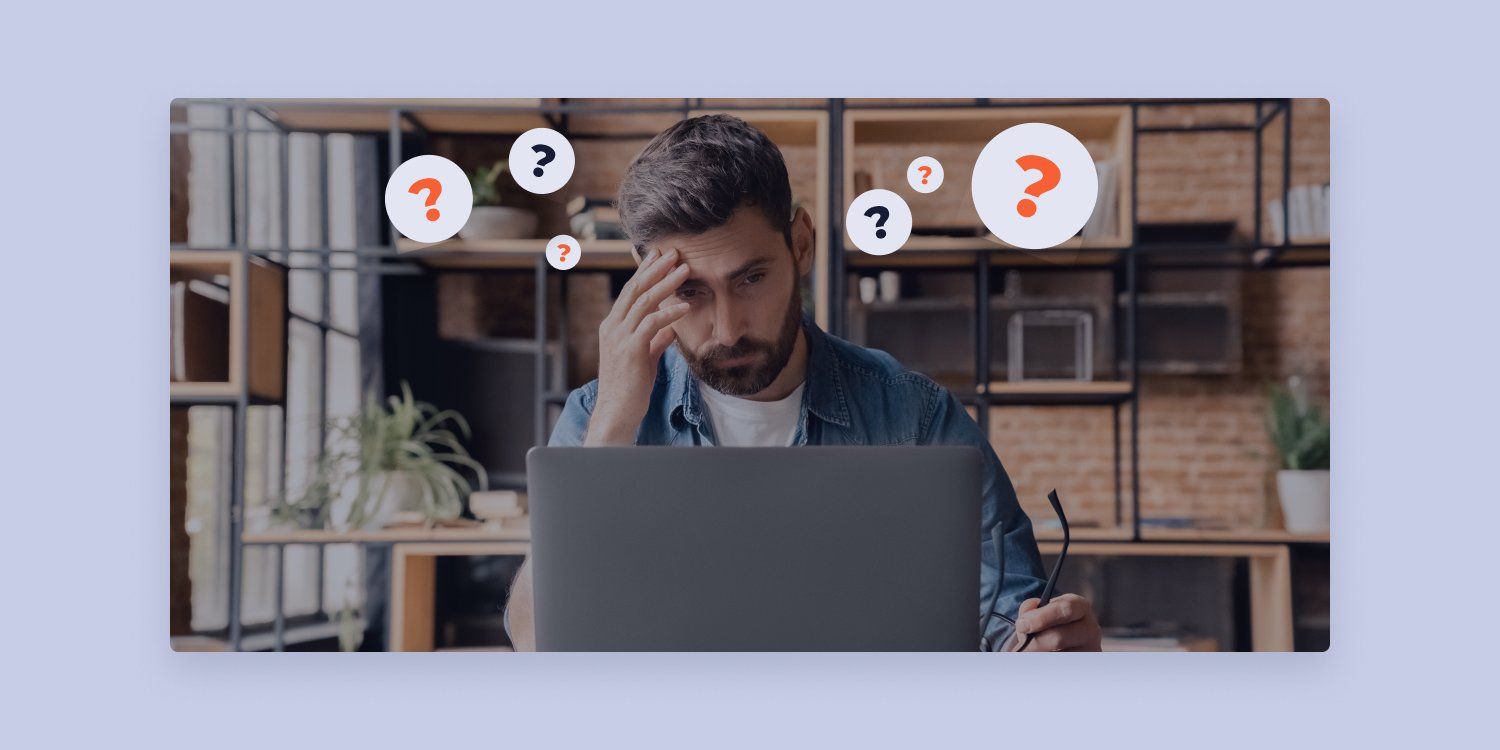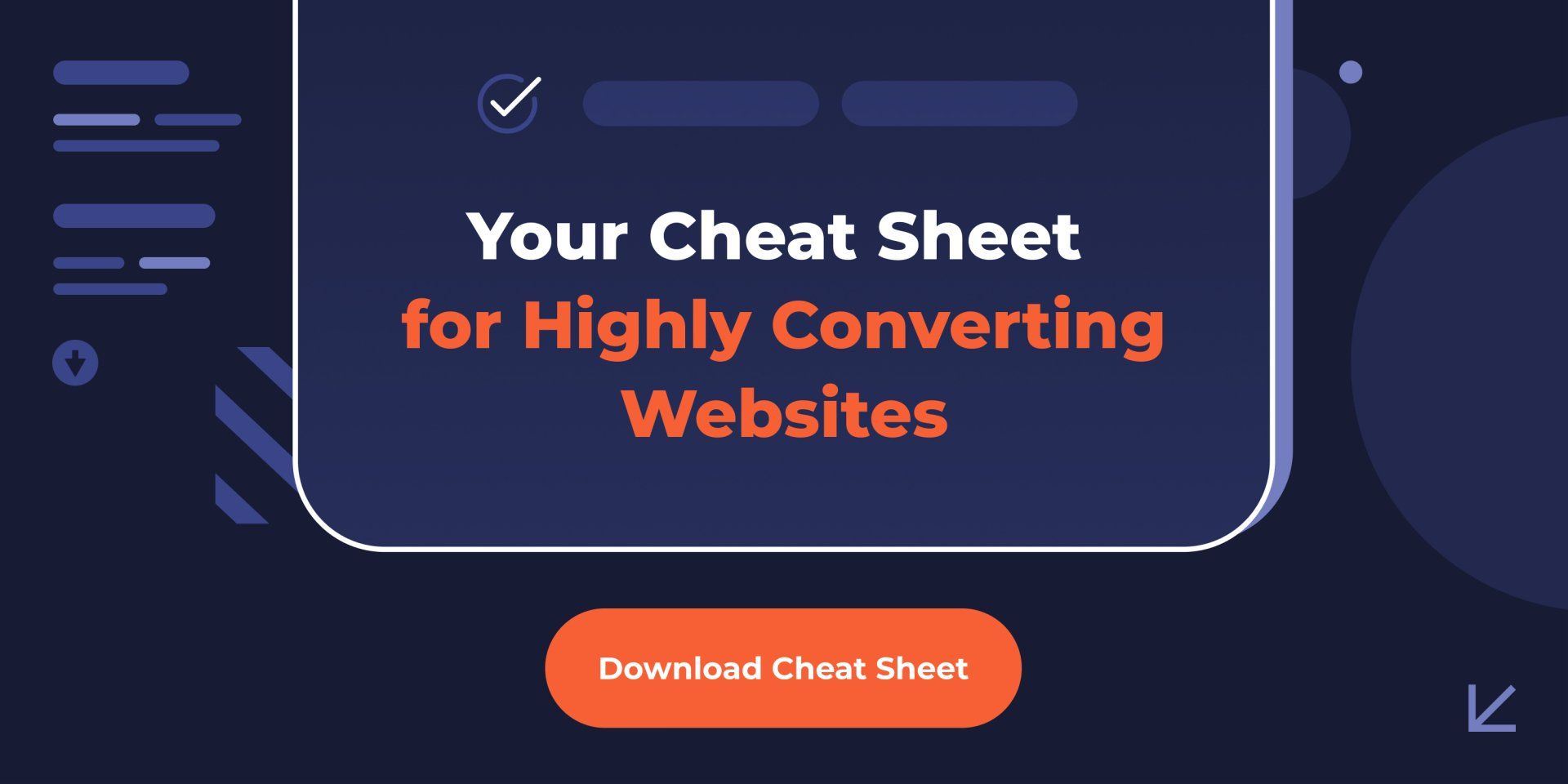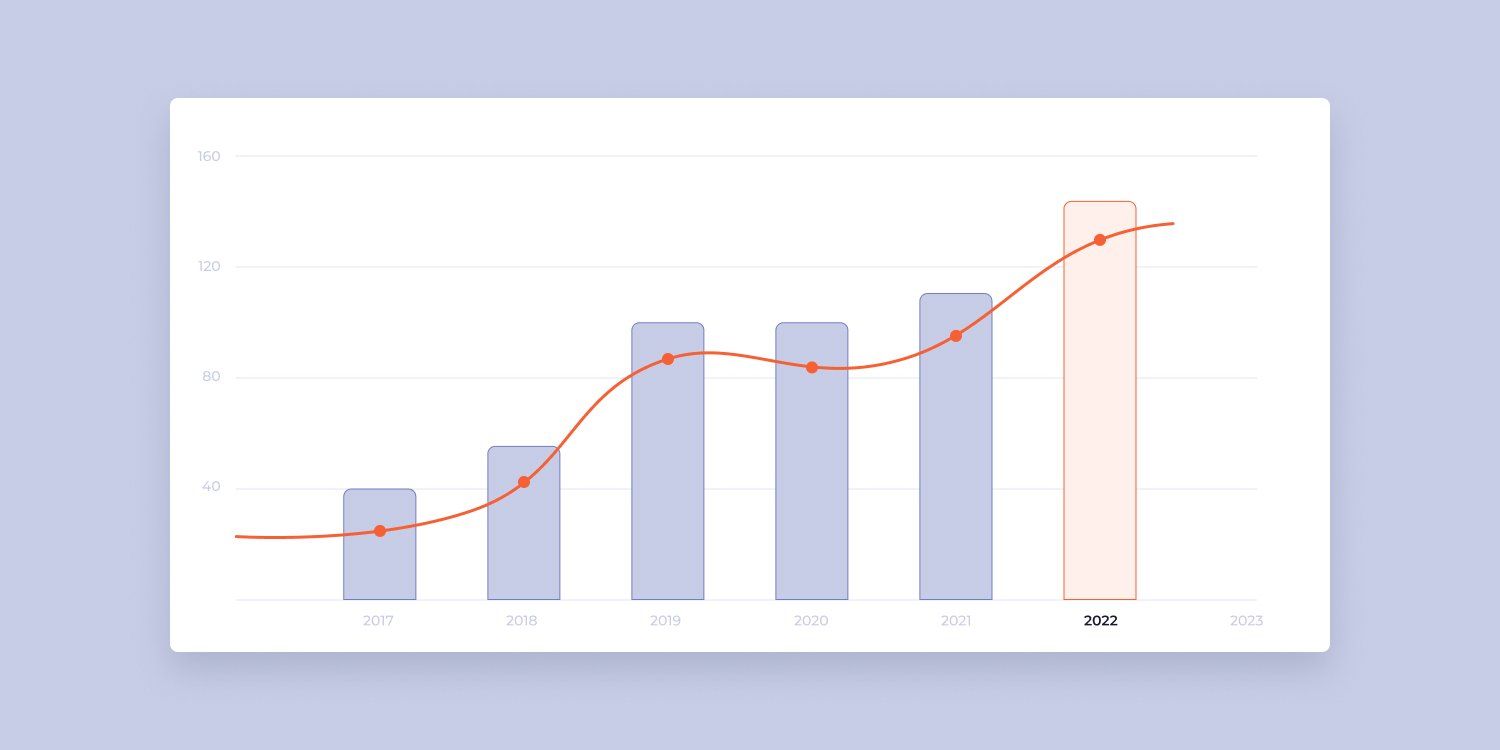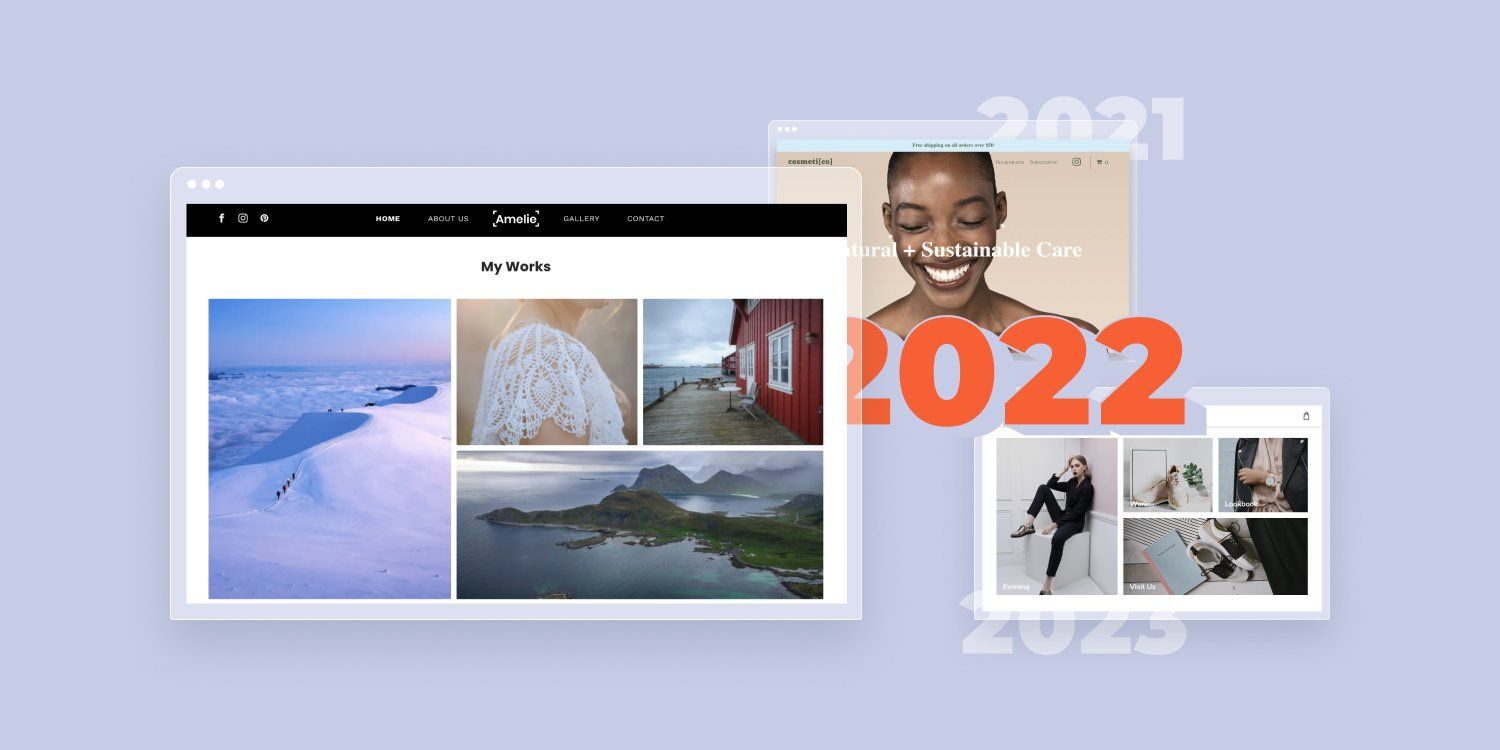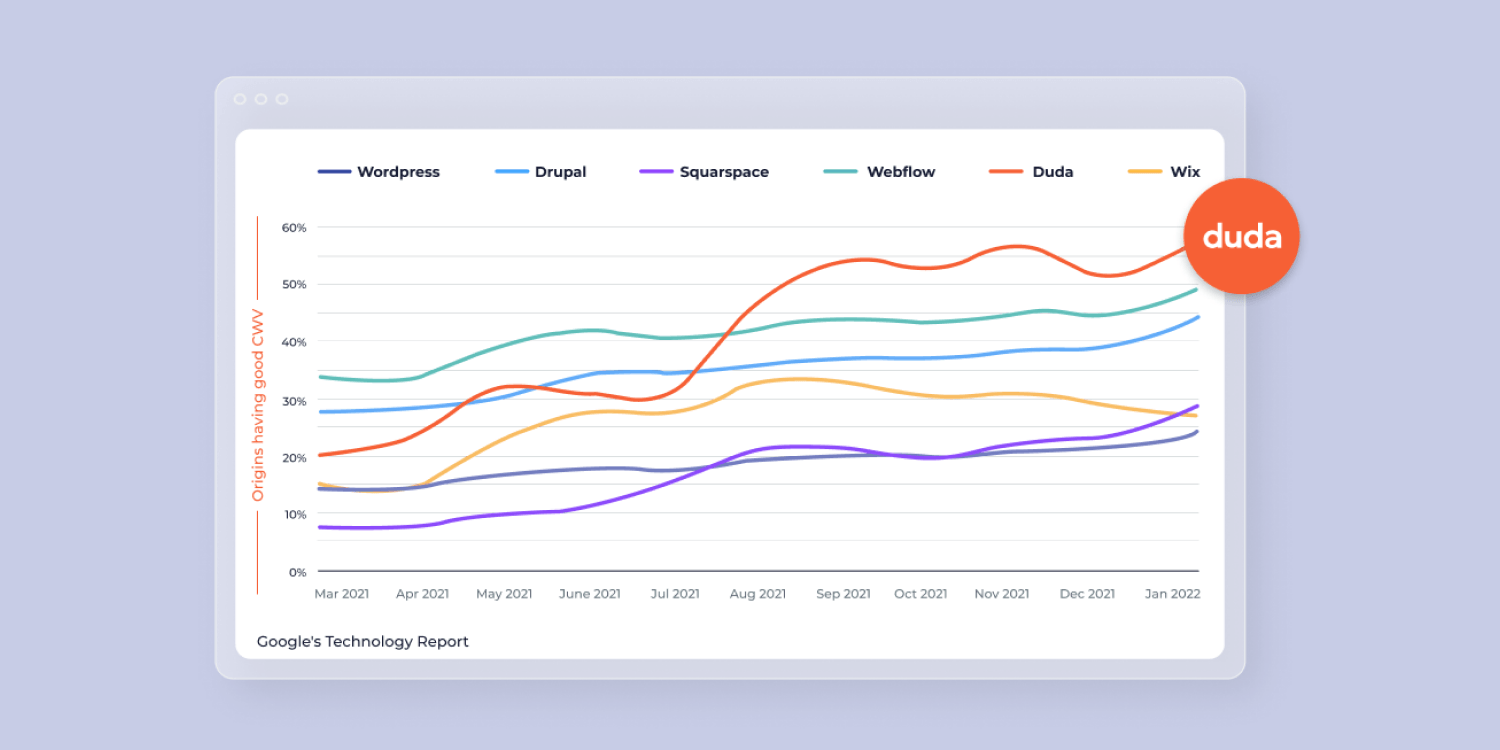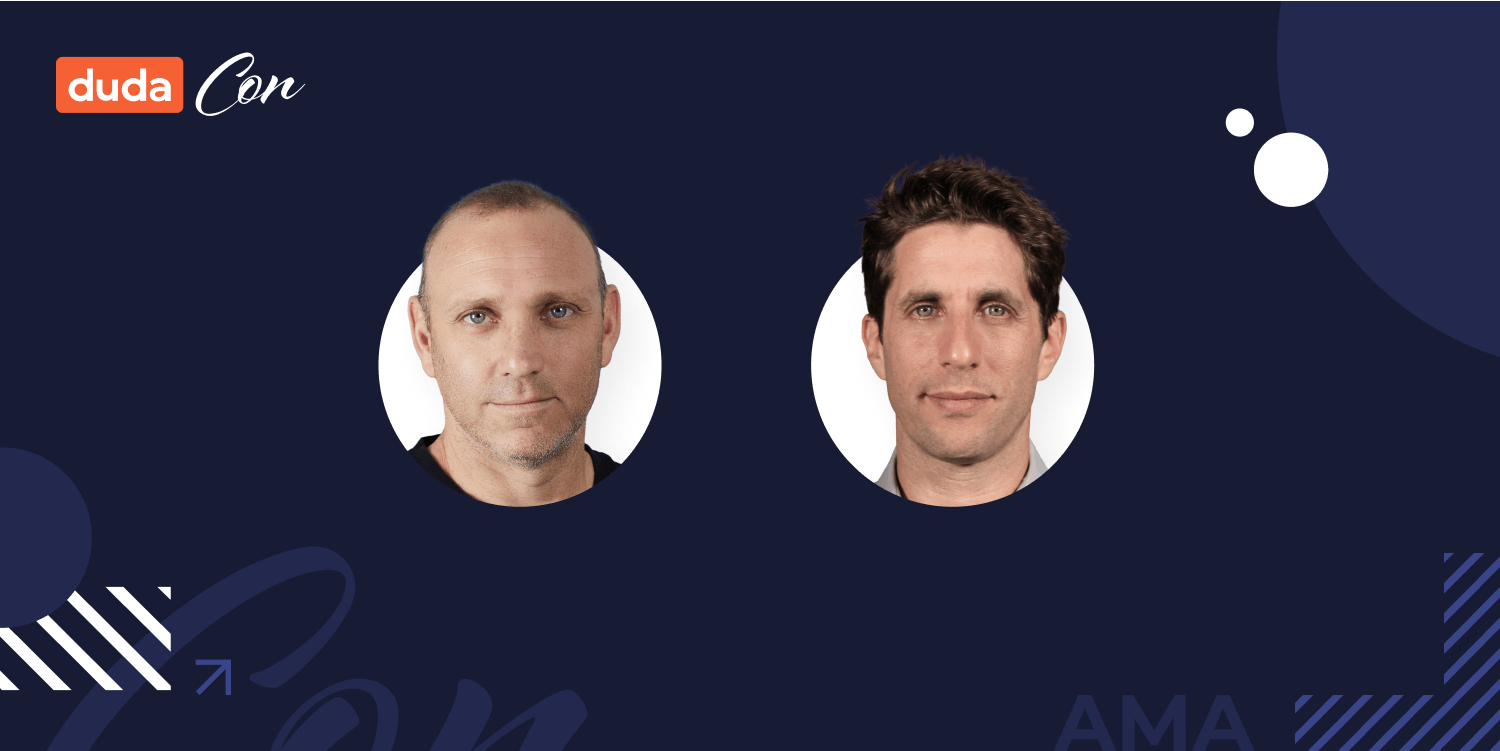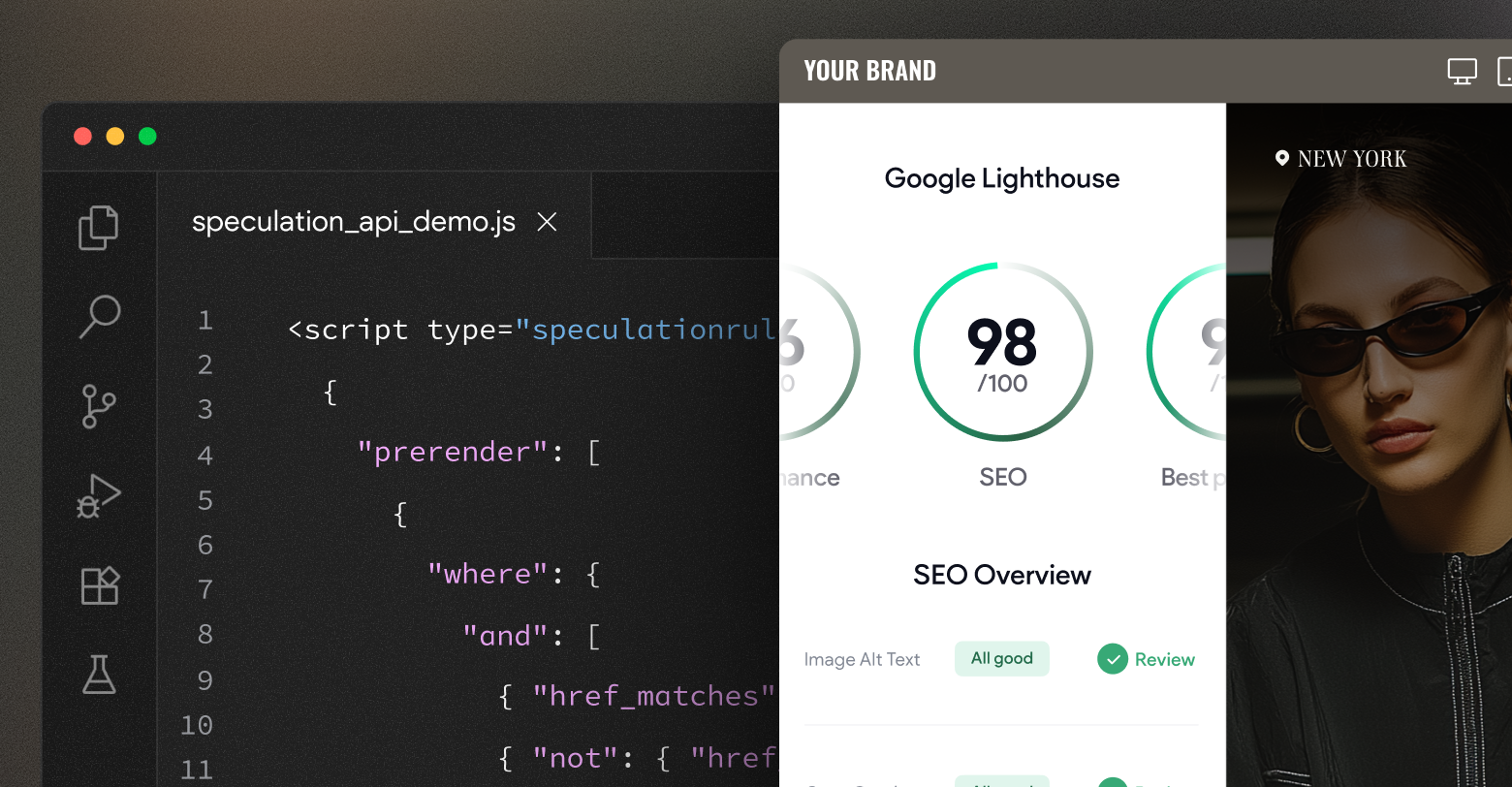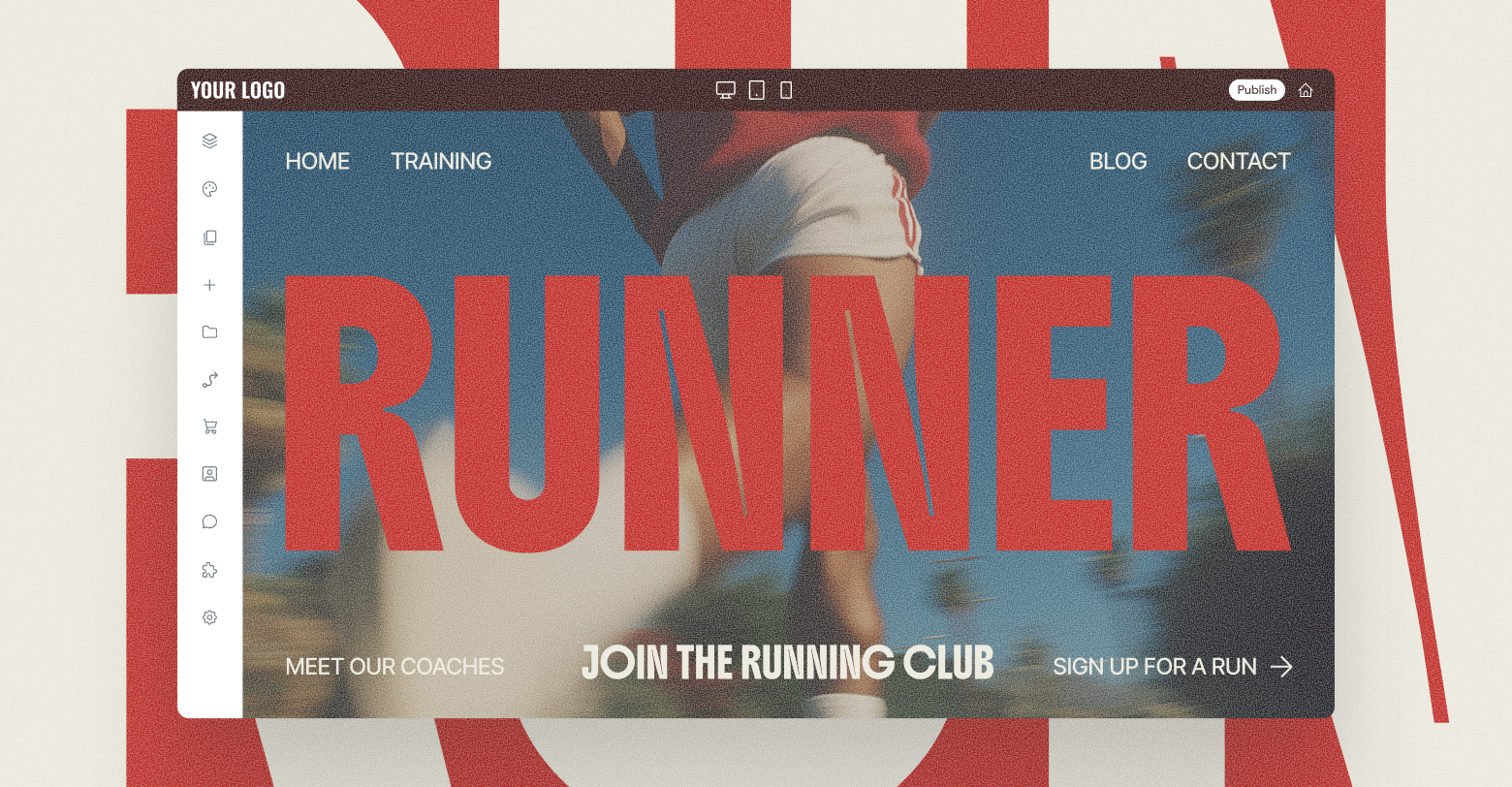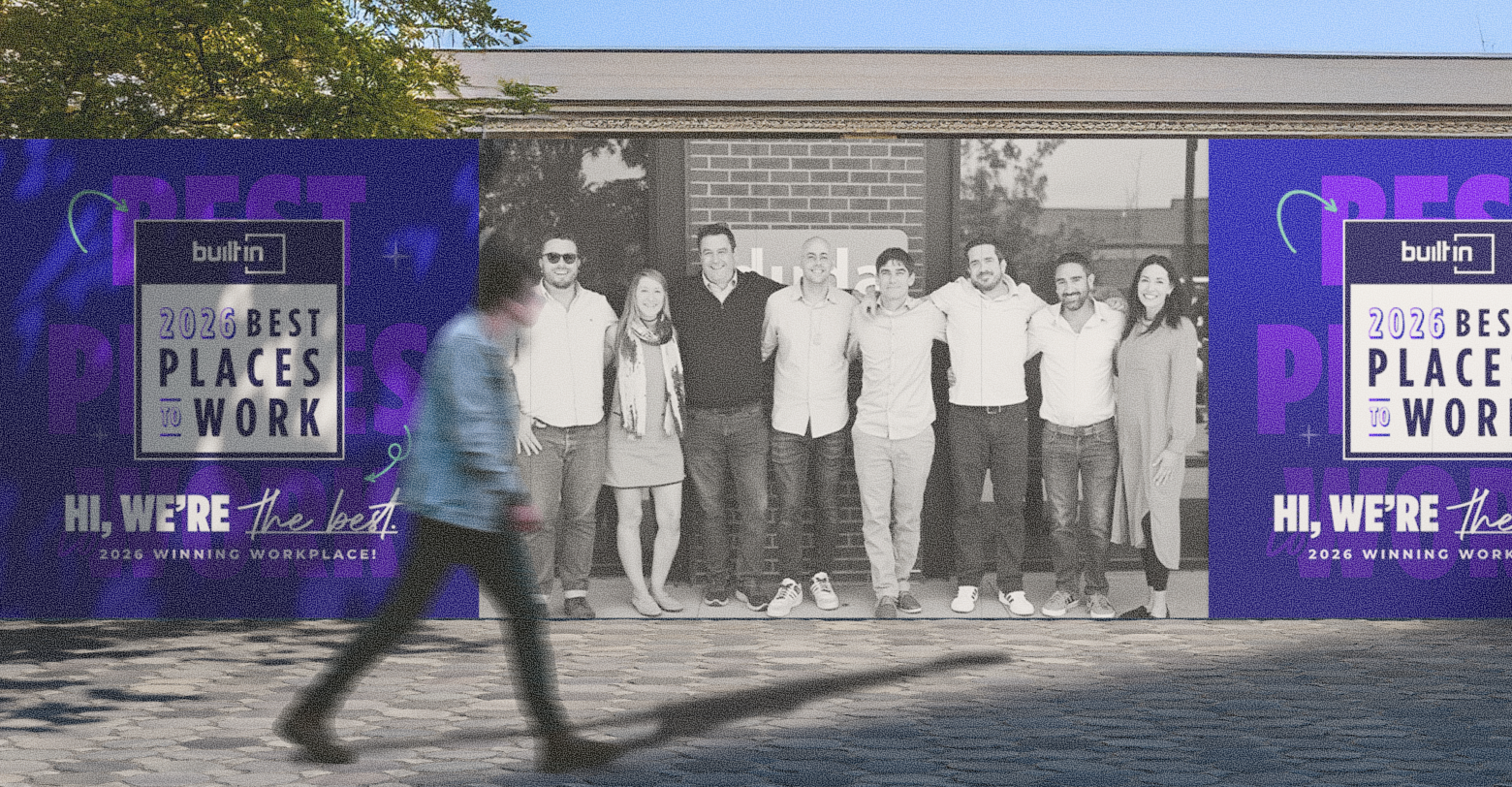New year’s resolutions - you gotta love them. We do, so much so that we based our first-ever DudaCon on them.
With the ambitious goal of bringing you closer to achieving your 2022 goals, and after surveying our partners around the globe, we embarked on the journey of creating an event that included a series of professional sessions designed to propel agency growth.
It was epic! Agency partners, industry leaders and Duda experts gathered together, and the result was awe-inspiring. 6 sessions in 3 days, packed with real-world tips, and just about everything you need to succeed as an agency in 2022.
Here’s a little taste of the exciting things that happened at DudaCon, but if you wish to view everything that went down, you can catch the recordings of all the sessions on
our YouTube channel.
Day 1 - Turn Websites into Conversion Engines
Andy Crestodina, Nancy Harhut, and our very own Kimberly Truong kicked off DudaCon with an inspiring discussion on how to turn websites into conversion engines, digging deep into the psychology of website visitors.
The session focused on the copy and design of a homepage, highlighting specificity and usability and how they correlate to website conversions. Considering the fact that above-the-fold components are the most important ones to prioritize when thinking of copy and design, all of them should get special attention.
For example, making sure all-above-the-fold components are clear and specific, including site headers, subheaders, navigation labels, CTAs, video, testimonials, and so forth.
Google playbook for UX and
research regarding prototypicality and perceived beauty back up the notion that components should be clear rather than clever, and recommend curbing creativity for the sake of usability in design. So, bottom-right vertical navigation? Stay away. People don't want to have to think when they go online (referencing the famous UX book by Steve Krug, “Don't make me think”).
“Yes, it’s unexpected,” Andy commented on the bottom-right vertical navigation, “but your job isn’t to be unexpected in how it is used. The job is to be unexpected in the information delivered, unexpectedly helpful, unexpectedly informative, some unexpected angle for the copy. Don't differentiate in your usability, I highly recommend against it.”
During an audit of websites that do it wrong versus those who got it right, the panel made a few interesting points regarding sites that emulate sales conversations and how to create them, all while answering real-time questions from the audience.
The panel gave special attention to testimonials and social proof and highlighted some tips for creating great testimonials such as starting a testimonial with a little bit of skepticism, taking the best part out of the testimonial, making it the subheadings, and instead of having testimonials pages have testimonials on every single page. “When you say it’ it’s marketing. When they say it, it’s social proof,” Andy summed it up.
The last part of the session was a super helpful, live clinic with live website reviews. Out of 370 submissions (!!!), the panel only had time for several reviews, but these were illuminating.
Go to the recording to check out Andy's tips
of wisdom.
Day 1 - Help Clients Grow with Local SEO
Next up, an insightful session by Ben Fisher and a panel of SEO experts, Dayna Lucio, Allie Margeson and Colan Neilsen, covered what works (and fails) in local SEO, discussed what we see in 2021 in local SEO and Google Business profile, some of the results of the local ranking survey, and jumped right into
2022 predictions.
So what were the highlights of 2021?
- The vicinity update - The biggest local algorithm-specific update in at least five years.
- An update seven years in the making, a name change for Google My Business now called
Google Business Profile.
- GMB insights - Google upgraded the insights, allowing you to see additional local-level data that highlights cool trends.
- Local pack
- It sure got a glow up in 2021
- Knowledge panel changes
- listings have gotten a lot of new features this year.
Allie from Whitespark covered
their 2021 Local Search Ranking Factors survey. After surveying over 40 experts in local search, they came up with a few keen insights:
As for 2022 predictions, here's a recap:
- An increased importance in relevant, hyper-localized content strategy, especially after the proximity update.
- In reaction to the vicinity update, merchants need to open up more locations or move. Using a grid tracker, like Local Falcon, BrightLocal or Places Scout, will also become more popular.
- Everyone should keep an eye on Apple maps and native reviews
- Expanded Google Business profiles in search experience, working directly in search
- Justifications on more local pack results
To view the full predictions as well as questions answered by the panel in the lightning round
go to the recording.
Day 2 - The Agency’s Guide to Fast Scaling
This day's agenda was filled with content to help you grow your agency. Ruan Morinho, together with Evan Bumbera and Duda’s Russ Jeffrey, explained how to leverage automated workflows and Duda’s API to cut production times & development costs significantly.
Ruan and Evan from
Develomark, kicked off the session with a presentation titled “How to Scale Client Services with Duda.”
They discussed their selling model, which can be summarized in one sentence: “Having one option is not an option,” offering 3 options (DIY, Done WITH you, Done FOR you), and then explained their development process. During the development process, they noted Duda’s
site comments feature as a way they communicate with their clients and do revisions.
Getting into the specifics on how they can make websites quickly and at scale, Ruan and Evan brought up Duda’s connected data to optimize the process and save time.
They showcased how the connected data magic works, even for other custom items (via Duda’s business text field) such as dynamic pricing (that changes day to day or according to the business requirements) and legal text (to automate it across multiple websites).
Another major time saver and an opportunity to scale mentioned by Ruan and Evan were
Duda’s dynamic pages that effortlessly create internal service pages, team pages, locations pages, and portfolio pages. With portfolio pages, it’s a great way to rank on Google for location-specific keywords, avoid spamming, as well as an opportunity to create social content.
There were a lot of questions from the audience regarding the specifics of building websites at scale. To watch the questions and answers,
go to the recording.
Day 2 - The Agency’s POV : Challenges & Opportunities in 2022
Russ stayed on to wrap up day 2 with a lively conversation by an impressive panel of experts, including Sharon Keevins, Peter Jones, Frank Cordon, Josh Neimark, Tina Snyder, and Alberto Alvarez. They discussed what it would take to deliver on your agency’s growth promise this year.
To get the party started, Russ asked the panelists what they were trying to do differently going into 2022? The panel mentioned refining planning and processes as one of the things they wanted to optimize going into 2022, and it paid off.
With processes, using things that can maximize time, thus help scale, such as Duda’s connected data and dynamic pages were also mentioned as a real game-changer.
Speaking of game-changers, the panel was asked what they have implemented during COVID-19 to help clients and their businesses succeed. Tina from
Fix8 Media explained how they came up with a special package for their clients: “the pandemic business stimulus package,” which had a low entry-level, allowing them to onboard a lot more clients at an affordable price and expose them to the Duda platform.
Next up, the panelists were asked what their primary growth drivers were? Is it ads, is it networking locally, is it referrals? Where do they driving new leads from? Josh answered: “we're very fortunate that it's mostly organic traffic and referral traffic.”
Other panelists pointed towards more areas that induce growth: SEO, PPC, networking (during COVID mainly online), and referrals. Alberto also mentioned what he called “Organic PR” as a good generator, building relationships with media outlets, having their content distributed by them to build reputation, SEO, and generate awareness.
Russ asked the panel what their biggest source of losing customers is or what specific techniques they use to retain customers. Frank answered: “we would lose customers when we were on WordPress. When a widget would go down, the phones would start ringing.
The next topic on the agenda was SEO, which Russ recognized as quite complicated to clients and sometimes misunderstood by them. He addressed the panel, asking what common misunderstandings they see and how they package and price their SEO services to ease communication gaps and difficulties.
Roberto explained that he uses packages tailored to the customer's size, targeting different needs. Big customers get full ongoing SEO support, while with SMBs, he doesn’t price SEO, but relies on Duda’s SEO features and capabilities.
The end of the session was the perfect opportunity to bring up the future. Russ asked the panelists' plans for the future in terms of selling a new service, a new channel to find customers, trends, their day-to-day operations, and so forth. The panelists had exciting answers to provide.
Aside from using technology platforms such as Duda, the panelists listed working with Amazon and other marketplaces, offering apps from Duda App Store, streaming, automation, borderless talent, in-housing, and much more.
For more questions and the brilliant answers by the panelists,
go to the recording.
Day 3 - Mastering the Ins & Outs of Core Web Vitals
Rounding out the last day of DudaCon, you can say we left the best for last.
Day 3 began with a spectacular panelist discussion surrounding Core Web Vitals (CWV) featuring Kiera Davidson of Salt Agency, Jamie Indigo of DeepCrawl, and Duda’s own Russ Jeffery. Russ got us all going with an insightful presentation that covered topics ranging from how Duda measures CWV, issues that arose in Duda websites due to CWV, and how Duda addressed those issues.
Some of the Key Issues & Fixes Mentioned in Russ’s presentation included:
- Addressing LCP (Largest Contentful Paint): Cookie and consent banners typically slow sites down, frequently used in European countries. So Duda partnered with Usercentrics to delay rendering and fonts to not load before primary content on the page.
- Addressing CLS (Cumulative Layout Shift): Media elements that lacked a height dimension were causing high CLS. To fix this, Duda applied a height and width value with CSS and Javascript to load sizes automatically.
- Addressing FID (First Input Delay):
Recaptcha, used in many Duda sites to prevent spammers from using contact forms, was causing a delay in the initial loading of the pages. Duda fixed this by disabling Recaptcha from loading until someone interacted with the contact form.
Russ remarked, “One of the interesting things about Duda is that we are hosting hundreds of thousands of websites, and we have to apply fixes that fix a lot of websites. Duda has to do this across the board and at scale.”
And the fixes have paid off nicely, with 61.6% of Duda sites currently passing CWV.
After Russ’s presentation, the panelists took turns answering questions about CWV. Topics ranged from using video backgrounds instead of images, image quality degradation, how to get Google to provide lab data from users, and a plethora of other topics that can be watched on the
recording here.
Day 3 - AMA | Duda’s Co-Founders & You
For the last day and final session of DudaCon, we turned to the audience for a live Q&A session with Duda’s Co-Founders, Amir Glatt and Itai Sadan.
In typical AMA style, DudaCon participants got the chance to ask Amir and Itai any burning questions that they had leading up to Duda’s first-ever AMA session. Enthusiastic participants asked a multitude of questions covering topics including new product releases, the creation of the company, the Duda Swag store, and of course, Duda’s connection to the Big Lebowski.
While many great questions were asked, Amir and Itai captivated participants with the heartwarming story of their friendship throughout the years and how they eventually started Duda together back in 2010.
Itai told how he and Amir had attended the same high school together in Israel but were not best friends until they became roommates while attending the same university together in the United States.
Amir playfully added, “I was the boy scout geek, and Itai was the surfer, so we ran in different crowds back then.”
While they had many great business ideas even while in college, the two went their separate ways, working at a few startups, before reconnecting in Palo Alto, California, at SAP, where they eventually decided to quit their jobs and start Duda.
While participants oozed with excitement over the story of how Duda was created, others redirected to additional Duda-related questions concerning new product releases coming up for 2022.
Amir took this opportunity to detail some of the newest Duda features that have been released earlier this year and a sneak peek into what features will be released later this year.
The features and products discussed included Duda’s new eCommerce solution from the recent SnipCart acquisition, paid membership, client billing, improvements to existing widgets, extended capabilities for connected data & collections, as well as better design flexibility.
Participants who followed Duda’s recent press releases were especially eager to learn more about what was to come with the SnipCart acquisition.
Amir mentioned that the initial Beta testing would begin in Q2 this year. “The product first has to be very Duda native. Which means that it’s not going to be another product in Duda, but our user experience, with built-in SEO, built-in performance, built-in design flexibility, easy to use, and so on.”
The session was chock-full of other great questions and responses that you can take a look at on
the recording.
For the finale, Itai left the participants with this remark, “We are there reading everything that you write. We want to build a better platform for you. Thanks for being great customers.”
The participants echoed Itai and Amir’s sentiment with one saying, “Thank you for your insights. It confirms that we made the right choice (with Duda).”
Till Next time…
It’s the beginning of year. That’s the perfect time to start examining your new year’s resolutions, as we did. DudaCon was created because we had a new year resolution we wanted to keep: bringing you closer to achieving your 2022 goals.
Here's one last treat from us, to you, in case you missed it.
Download "Top 10 Tips for Highly Converting Websites", a cheat sheet based on one of the most illuminating sessions at DudaCon.

